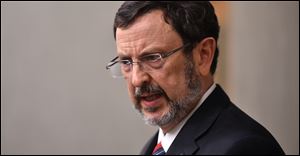
A victory for free speech
3/20/2018
Indiana University of Pennsylvania President Michael Driscoll made a principled stand for academic freedom.
On Monday, Indiana University of Pennsylvania President Michael Driscoll made an important and courageous decision to reinstate a student who had been temporarily barred from a religious studies class after making controversial remarks on gender identity.
The student, Lake Ingle, was awaiting a decision from the college’s Academic Integrity Board after claiming in class that he believes there are only two genders and after he disputed the existence of “white male privilege.”
EDITORIAL: Defend free inquiry
Mr. Driscoll announced his plan to “indefinitely pause the formal university process without resolution.” Mr. Ingle will be permitted to return to the class — which he needed to graduate — on the condition that he behave respectfully in the classroom during discussion and debate.
In an email sent to the entire campus community, Mr. Driscoll also expressed disappointment that “in the presence of a test of our devotion to the First Amendment and to the IUP Way, we fell short as a community.”
The IUP Way, as the school defines it, is to include all students and their opinions in a respectful academic environment.
“In matters that involve the fundamental values of IUP such as open discussion, civil dialogue, and reasoned disagreement in the service of learning,” Mr. Driscoll wrote, “I will take the risks rather than rest on the safe ‘but foolish consistency that is the hobgoblin of little minds.’”
By taking this course of action, Mr. Driscoll has not only made the correct decision — to reinstate a student who appears to have been unfairly punished for his opinions — but he has taught his campus a tremendous lesson about the value of free speech and open discourse.
Click here to view more Blade editorials | Check out the Behind The Editorial series
Higher education is about constantly confronting what we think we know and amending our thoughts based on new information or a deeper understanding. That requires study. It also requires dialogue and debate. Anyone willing to express an opinion should have the intellectual fortitude to stand up to a critic, in a classroom or out.
Ensuring the right to speak for the most “offensive” among us ensures the right of all of us — whether we be white, black, straight, gay, Christian, Muslim, Jewish, atheist, anti-Trump, or pro-Trump — to also speak our minds. That includes the right to respectfully counter the arguments of others and to have our own arguments countered.
Mr. Driscoll is to be commended for standing up for academic freedom and free expression on his campus. He said: “In a free society, people with opinions you don’t like are allowed to exist, are allowed to speak, and can call you names.”
And that, in some sense, says it all.
Follow @BladeOpinion on Twitter.